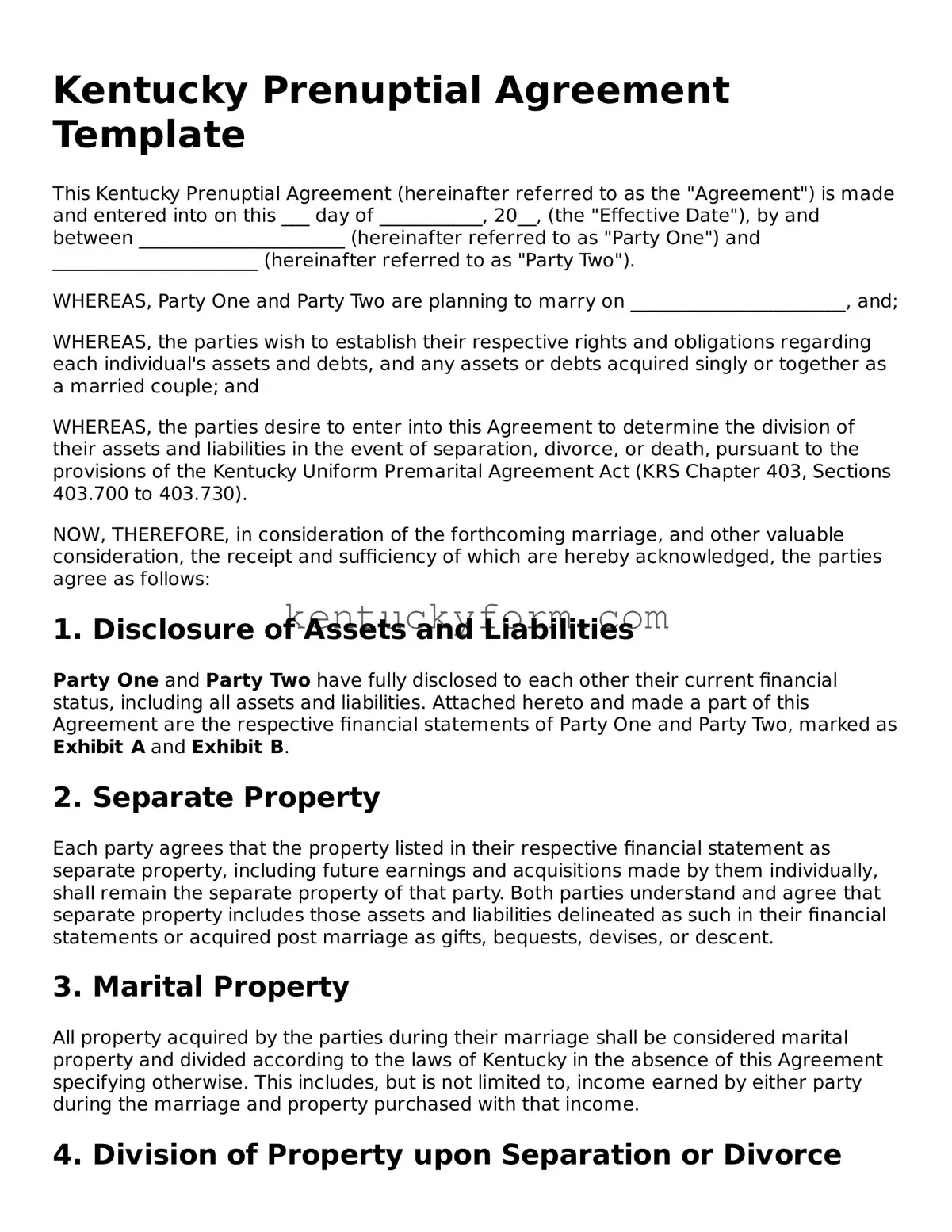Kentucky Prenuptial Agreement Template
This Kentucky Prenuptial Agreement (hereinafter referred to as the "Agreement") is made and entered into on this ___ day of ___________, 20__, (the "Effective Date"), by and between ______________________ (hereinafter referred to as "Party One") and ______________________ (hereinafter referred to as "Party Two").
WHEREAS, Party One and Party Two are planning to marry on _______________________, and;
WHEREAS, the parties wish to establish their respective rights and obligations regarding each individual's assets and debts, and any assets or debts acquired singly or together as a married couple; and
WHEREAS, the parties desire to enter into this Agreement to determine the division of their assets and liabilities in the event of separation, divorce, or death, pursuant to the provisions of the Kentucky Uniform Premarital Agreement Act (KRS Chapter 403, Sections 403.700 to 403.730).
NOW, THEREFORE, in consideration of the forthcoming marriage, and other valuable consideration, the receipt and sufficiency of which are hereby acknowledged, the parties agree as follows:
1. Disclosure of Assets and Liabilities
Party One and Party Two have fully disclosed to each other their current financial status, including all assets and liabilities. Attached hereto and made a part of this Agreement are the respective financial statements of Party One and Party Two, marked as Exhibit A and Exhibit B.
2. Separate Property
Each party agrees that the property listed in their respective financial statement as separate property, including future earnings and acquisitions made by them individually, shall remain the separate property of that party. Both parties understand and agree that separate property includes those assets and liabilities delineated as such in their financial statements or acquired post marriage as gifts, bequests, devises, or descent.
3. Marital Property
All property acquired by the parties during their marriage shall be considered marital property and divided according to the laws of Kentucky in the absence of this Agreement specifying otherwise. This includes, but is not limited to, income earned by either party during the marriage and property purchased with that income.
4. Division of Property upon Separation or Divorce
In the event of a separation or divorce, the parties agree to divide their marital property in accordance to the terms set forth in this Agreement, or if not specified, then in accordance with mutual agreement or Kentucky law.
5. Spousal Support
Both parties agree that, under certain conditions, one party may be entitled to support from the other. Such conditions, and the parameters of the support, including but not limited to the duration and amount, shall be specifically detailed in this Agreement.
6. Amendment and Revocation
This Agreement may be amended or revoked only by a written document signed by both parties. No oral modifications shall be effective.
7. Governing Law
This Agreement shall be governed by and construed in accordance with the laws of the State of Kentucky, without giving effect to any choice or conflict of law provision or rule.
8. Entire Agreement
This Agreement constitutes the entire agreement between the parties concerning the subject matter hereof and supersedes all other agreements, representations, and understandings of the parties, written or oral.
9. Signatures
IN WITNESS WHEREOF, the Parties have executed this Agreement as of the Effective Date first above written.
_________________________________
Signature of Party One Date
_________________________________
Signature of Party Two Date
NOTARY PUBLIC
State of Kentucky
County of _______________
On this, the ___ day of ___________, 20__, before me, _______________________, a notary public, duly commissioned and sworn in the county and state aforesaid, personally appeared _______________________ and _______________________, known to me (or satisfactorily proven) to be the individuals whose names are subscribed to the within instrument, and acknowledged that they executed the same for the purposes therein contained.
IN WITNESS WHEREOF, I have hereunto set my hand and official seal.
_________________________________
Notary Public Signature My Commission Expires: ___________

